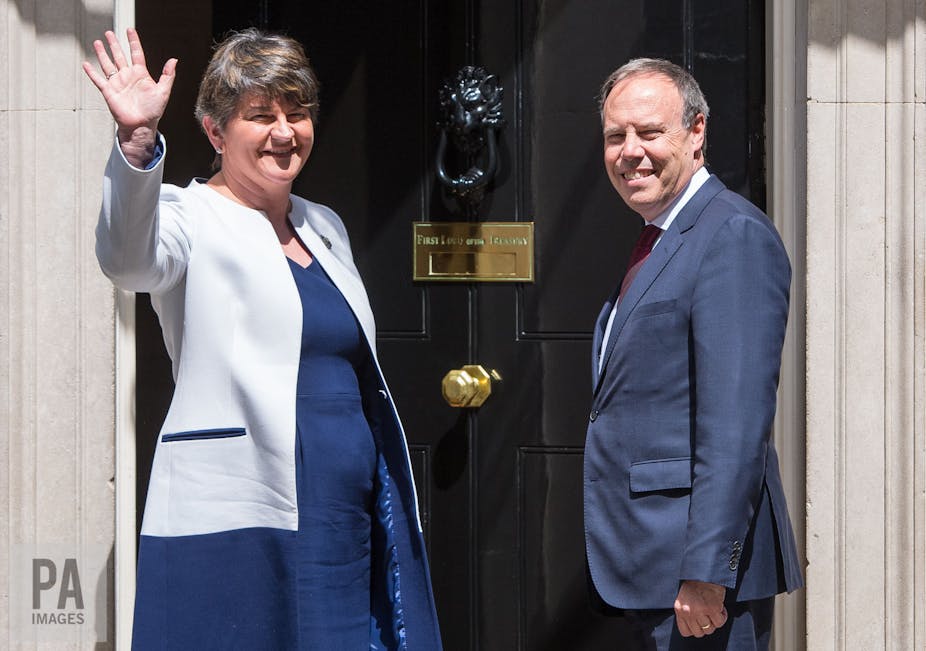In the hope of operating as a minority government after failing to win the UK general election, Theresa May’s Conservative party plans to rely on the support of Northern Ireland’s Democratic Unionist Party. And while the content of this deal is the subject of great interest, the day-to-day practicalities of how the arrangement will work are equally important.
It is important to note that the deal between the Conservatives and the DUP is not a formal coalition. No DUP MPs will be in government and the DUP will not be sitting on the government benches in the House of Commons. The party won’t receive official support from the civil service either. In fact, it will still receive short money – funding provided to the opposition parties in parliament.
The first test of the agreement will be the Queen’s speech, in which the government sets out its legislative plans for the year ahead. MPs then vote on the speech. While this is not an official vote of confidence, May must secure the support of the House of Commons in this vote to remain in office.
Assuming this first test is passed, the agreement with the DUP then moves on to the more substantive stage – dealing with legislation brought before the House of Commons.
The longer-term objective of the deal is to allow the timely passage of government legislation through the House of Commons as painlessly as possible for the Conservative party. May is in a precarious position here. Even if the Conservatives make an offer good enough to secure the DUP’s backing, the combined majority of the two parties is still only six.
Unless it can keep the SNP and Liberal Democrats on side in votes, the government will be under constant threat of losing votes on the floor of the house and will have even more difficulties in select committees.
Channels of communication
In many ways, the agreement is simply a more formalised version of “the usual channels” – the informal mechanism whereby parties agree the timetable of parliamentary business. In normal times, these discussions would be conducted through the chief whips of the government and opposition parties. These processes will still be in place but the Con-DUP interactions will take priority. A government majority will need to be guaranteed before other parties can be brought into the discussion.
Trust between the two parties’ go-betweens will have to be quickly established. Key players in this will be the Leader of the House, Andrea Leadsom and the chief whip, Gavin Williamson. Together they organise government business.
The government will also need a formidable team in the whips office to avoid the ignominy of retaining the support of the DUP but not securing that of all Tory party MPs. If the agreement falters, expect to hear about government whips haranguing Tory MPs in the precincts of parliament and forcing them through the voting lobbies.

Nigel Dodds, leader of the DUP in the House of Commons will be a formidable leader on this deal (Arlene Foster, leader of the DUP, is not an MP and so will not been directly involved). Jeffery Donaldson, chief whip of the DUP, is also known as a shrewd operator, so Leadsom will need to be on her mettle in her dealings with him.
The committee option
To avoid dramas turning into crises, a Con-DUP consultative committee may be established. That could perhaps be chaired by the new first secretary of state, Damian Green, with a quad of negotiators made up of Leadsom, Williamson, Dodds and Donaldson. Some government ministers and DUP spokespeople could attend, depending on the policy area under discussion. Their aim would be to discuss possible areas of conflict and find amicable solutions – this might be easier said than done, especially as the great repeal bill makes its way through the house.
Given the delicate status of the talks taking place in Stormont to restore power-sharing this “consultation process” might evolve rather be announced on day one. Both parties will wish to avoid the DUP being seen as too closely allied with the government. That would jeapordise the government’s commitment to “rigorous impartiality” towards the political parties of Northern Ireland, as set out in the Good Friday Agreement. It will nonetheless be necessary to have Con-DUP meetings in some form to avoid a crisis developing.
The Conservatives may also seek to establish a corresponding consultation committee with their own backbenchers. Here Graham Brady, chairman of the backbenchers’ 1922 committee, will be a key player, again with Damian Green as de facto deputy prime minister probably playing a role in retaining the support of backbenchers.
What will the opposition get up to?
In the first few weeks of the new parliament, opposition parties will almost certainly look to expose divisions between the government, its own backbenchers and the DUP. However, it is not in their interest to force a crisis on every vote. The Conservative-DUP agreement could be sustained for a surprisingly long period, while the Labour party waits for the almost inevitable crisis to develop and then looks to exploit it.
Personal relationships matter in such an agreement. Whether May can work effectively with Dodds, Donaldson and Foster and retain the support of all of her own troops is perhaps open to question.

